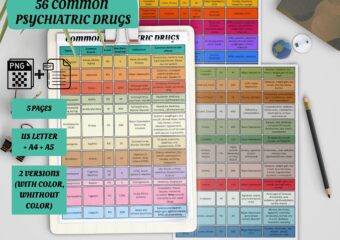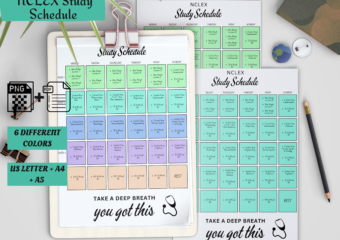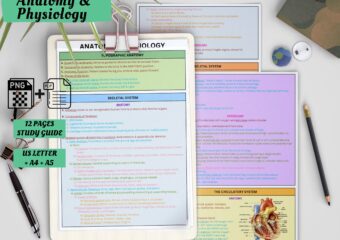How Hard is Nursing School Compared to Other Degrees?

- How to Write Effective Therapy Progress Notes - January 7, 2025
- How to create SMART Goals in Therapy - October 8, 2024
- MICU vs SICU: What is the difference? - March 25, 2024
The nursing profession is indeed one of the most demanding careers, built on a foundation of in-depth knowledge, unfaltering empathy, and profound resilience. But these characteristics are not just brought to the fore on the job, they are forged in the rigorous crucible that is nursing school. So, the question that we are going to delve into today is: How hard is nursing school compared to other degree programs?
How Hard is Nursing School Compared to Other Degrees?
The journey through nursing school is indisputably rigorous, yet equally rewarding. It demands the marriage of rigorous academic learning with the skillful application, forming the backbone of what makes this degree program especially challenging.
At the core of the nursing, curriculum is intensive theoretical subjects that are akin to those in medicine, such as anatomy, pathophysiology, pharmacology, and public health, to name a few. The complexity of these subjects can be compared to that of science, engineering, or other medical disciplines. Moreover, nursing students also learn about the legal and ethical issues in healthcare, patient education, and leadership and management principles, further diversifying their knowledge base.
However, what sets nursing education apart from many other degrees is the extensive clinical practice integrated into the program. Theoretical learning is continually paired with real-world applications. Students spend significant hours in clinical rotations in various healthcare settings, learning to apply their knowledge directly to patient care. This requirement of the immediate application of learned principles makes the nursing curriculum notably challenging.
Furthermore, the high-stakes nature of healthcare education adds an extra layer of pressure. Nursing students often find themselves in emotionally intense situations very early in their careers. The awareness that their decisions and actions can significantly impact a patient’s health and well-being adds to the complexity of their education.
In comparison, degree programs like business or liberal arts may have their challenges, but they often lack the high-pressure, hands-on application that characterizes nursing education. Therefore, while the difficulty of any course is largely subjective, the complex blend of high-intensity academics, practical application, and emotional involvement makes nursing school uniquely challenging.

What are the Different Types of Nursing Degrees?
Just like any other profession, there are different levels of nursing degrees, each with their unique complexities. They range from entry-level programs to advanced ones.
- Diploma in Practical Nursing (LPN/LVN): This is an entry-level qualification that typically takes one year to complete and prepares students for basic patient care under the supervision of an RN or doctor.
- Associate Degree in Nursing (ADN): This two-year program provides a broader scope of practice than the LPN/LVN diploma and is often a stepping stone toward becoming a registered nurse.
- Bachelor of Science in Nursing (BSN): This is a four-year degree that offers comprehensive exposure to nursing theory, research, public health, and direct patient care.
- Master of Science in Nursing (MSN): This advanced degree focuses on specialized areas of nursing such as nurse practitioner, clinical nurse specialist, nurse educator, etc.
- Doctor of Nursing Practice (DNP) and Ph.D. in Nursing: These are the highest levels of nursing education focused on clinical practice and academic research, respectively.
Getting Into A Nursing School
Securing admission into a nursing school can be an arduous journey in itself. The process is often competitive, owing to the increasing demand for nursing professionals and the limited capacity of nursing programs.
The first step towards admission into nursing school typically involves meeting certain academic prerequisites. These prerequisites usually include a solid academic track record, particularly in core science subjects such as biology, chemistry, and anatomy. A high GPA in high school or previous college coursework can significantly enhance an applicant’s chances of getting accepted.
For those aiming at Bachelor of Science in Nursing (BSN) programs, a good score on the Test of Essential Academic Skills (TEAS) is often mandatory. The TEAS test evaluates a candidate’s skills in the areas of reading, mathematics, science, and English and language usage.
However, academic achievements alone do not guarantee admission. Given the nature of nursing as a profession, nursing schools also look for candidates who exhibit strong interpersonal skills, a compassionate disposition, emotional resilience, and a genuine commitment to patient care. Candidates may be evaluated through personal interviews or essays for these qualities. Volunteering or working in healthcare settings can also boost a candidate’s profile by demonstrating their commitment and providing them with valuable experience.
In addition, some nursing programs may have more specific requirements, like criminal background checks, drug screenings, and proof of immunizations. It is also not uncommon for schools to require students to hold a CPR certification or complete a Certified Nursing Assistant (CNA) program before commencing their studies.
Ultimately, getting into nursing school is a multi-faceted process that evaluates candidates on various academic and personal parameters. It is a process designed to ensure that the individuals admitted to the program have the potential not only to succeed acadically but also to flourish in their roles as future healthcare professionals.

Tips For Making Nursing School Easier
Nursing school, with its extensive academic requirements and rigorous practical components, can be quite daunting. However, there are numerous strategies that can help students navigate this demanding journey more smoothly.
- Master Time Management: Developing effective time management skills is paramount. This involves organizing your schedule to accommodate lectures, studying, clinical rotations, and personal time. A well-planned schedule can prevent you from feeling overwhelmed and can also increase your productivity.
- Form Study Groups: Studying in groups can be a highly beneficial strategy. Different individuals can bring varied perspectives and insights that can enhance understanding of complex concepts. Group members can also provide moral support and encouragement, which can be extremely beneficial in managing the pressures of nursing school.
- Prioritize Self-Care: Amidst the demanding rigors of nursing school, self-care often takes a back seat. However, maintaining physical health through regular exercise, a balanced diet, and adequate sleep is crucial. It’s also important to pay attention to mental health. Stress management techniques such as meditation, yoga, or simply taking time out for hobbies can go a long way in ensuring emotional well-being.
- Utilize Institutional Resources: Most educational institutions offer a variety of resources to assist students. Academic advisors, tutoring services, writing centers, and mental health services are all invaluable resources that can significantly improve your nursing school experience. Don’t hesitate to reach out for help when needed.
- Hands-On Practice: Practical skills form a significant component of nursing education. Make it a point to practice these skills as much as possible. Not only does this reinforce learning, but it also builds confidence in performing these procedures in real-life clinical settings.
- Stay Curious and Engaged: Engage with the coursework and stay curious. Attend seminars, participate in workshops, or join nursing-related clubs or organizations. These extracurricular activities can provide additional learning opportunities, offer networking platforms, and also add fun to the nursing school journey.
- Develop Strong Relationships: Foster strong relationships with your peers, mentors, and faculty. These connections can provide you with invaluable support, guidance, and camaraderie throughout your nursing school journey, and often, well beyond that.
Remember, while nursing school is challenging, it’s also a journey of personal and professional growth. By leveraging these strategies, you can not only make your nursing school journey less stressful but also more enriching and rewarding.




